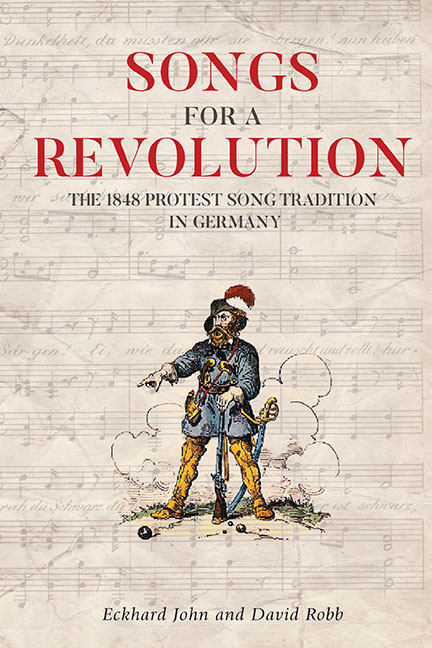Book contents
- Frontmatter
- Contents
- Preface
- Introduction: The Emergence of Political Song 1830–48
- Part I Before 1848: The Vormärz
- Part II 1848–49
- Part III 1848 in Memory
- Conclusion: The Making of Tradition; The Protest Songs of 1848 in the German Folk Revival 303
- Bibliography
- Discography
- Index of Names and Terms
- Index of Song Titles
Conclusion: The Making of Tradition; The Protest Songs of 1848 in the German Folk Revival 303
Published online by Cambridge University Press: 23 October 2020
- Frontmatter
- Contents
- Preface
- Introduction: The Emergence of Political Song 1830–48
- Part I Before 1848: The Vormärz
- Part II 1848–49
- Part III 1848 in Memory
- Conclusion: The Making of Tradition; The Protest Songs of 1848 in the German Folk Revival 303
- Bibliography
- Discography
- Index of Names and Terms
- Index of Song Titles
Summary
AS THIS BOOK HAS DOCUMENTED, the period of the Vormärz (from the French July Revolution of 1830 up to March 1848) and the revolution of 1848−49 produced a wealth of political songwriting in Germany. It was an era of restoration, a particularly volatile period in which broader sections of German society were striving for political emancipation from the princes and kings. A new oppositional consciousness emerged in the songs of the period, songs that reflected themes ranging from freedom of speech and the need for democratic and national self-determination to critiques of injustice and hunger, and parodies of political convention and opportunism. A tradition of socially critical songs emerged, one that was marked by ruptures and sporadic revivals over the next century. In the Third Reich these songs were completely banned, causing them to fall into obscurity. They were revived after the Second World War, first in the GDR by political song researchers and ethnomusicologists, and then in the 1960s by a new generation of folksingers in West Germany. The rebellious nature of the lyrics of the Vormärz and 1848 songs resonated with countercultural movements in both states who were keen to reestablish their own tradition of democratic songs of protest.
This rediscovery, however, was not just the counterreaction of singers and academics to the misuse of German folk songs by the Nazis. Such a shift to a more “progressive” interpretation and promotion of folk tradition at that time was not limited to Germany and had already taken place in other parts of the Western world. After first examining the relationship between folk song and national ideologies in the nineteenth century, in this chapter we will focus on the democratic ideological basis on which the 1848 revolutionary-song tradition was reconstructed after the Third Reich. We will look at how the New Social Movements of West Germany and the folk scene of the GDR functioned in providing channels of transmission for this, and how in this process a collective cultural memory was created whereby lost songs—such as those of the 1848 Revolution— could be awakened from extinction. These processes will be illustrated with references to textual and music adaptations of key Vormärz and 1848 songs that have been examined in this book.
- Type
- Chapter
- Information
- Songs for a RevolutionThe 1848 Protest Song Tradition in Germany, pp. 303 - 328Publisher: Boydell & BrewerPrint publication year: 2020

